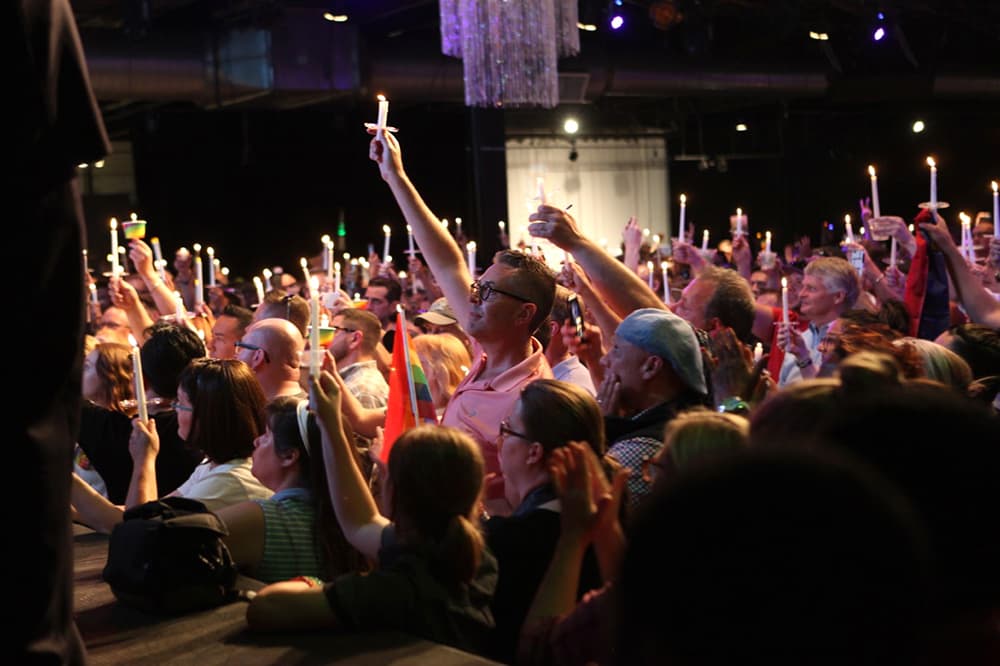
Denver does well in ensuring equality and support for LGBTQ people, according to a Human Rights Campaign index of more than 500 U.S. cities. Let's dig into why that is.
Denver notched 82 out of 100 points on the Municipal Equality Index. The rest of Colorado's scores:
- Boulder and Fort Collins - 74 out of 100
- Aspen - 62
- Lakewood - 60
- Aurora - 59
- Colorado Springs - 53
- Littleton - 48
Municipal services:
Denver gets points for having a commission on human rights, but it loses out for a supposed lack of a liaison for LGBTQ people in the mayor's office.
Now, Denver does have an LGBTQ liaison, according to the city. His name is Anthony Aragon -- you can email him! But it appears that Denver lost out because this liaison, who's supposed to be a conduit for LGBTQ issues, isn't very well advertised. I wasn't able to find him listed as the liaison anywhere on Denver's website, and it's not listed on his LinkedIn.
"We do ask for the liaisons to be published so that the general public are able to contact those liaisons ... so that folks in the public know there’s someone in the government they can call and talk to about it," said Kate Oakley, senior legislative council for the Human Rights Campaign.
In the city's defense, it's pretty easy to find contact information for its Lesbian, Gay, Bisexual, Transgender & Queer Commission, which presumably can get concerns to the right place.
Denver gets credit for having anti-bullying policies in schools and for giving its human rights commission some teeth. It loses out on "bonus" points for a reported lack of services that particularly serve transgender people and LGBTQ young, homeless and elderly people. I'm waiting on some clarification from the city on this one.
Laws:
The city scored well on its laws, thanks to local legislation that bans discrimination on the basis of sexual orientation and gender identity. For comparison, Aurora and Aspen both were rated as lacking these laws, although the entire state of Colorado does ban LGBTQ discrimination.
Employment:
Denver scored well in how it treats employees, as it has non-discrimination employment policies and transgender-inclusive health care benefits.
Interestingly, the scorecard docked Denver three points in this category, saying it doesn't have an ordinance banning employment discrimination by contractors.
However, Denver does have an ordinance that forbids discrimination by any employer on "gender ... sexual orientation, gender variance," and other factors. Double however: Religious organizations are excluded, and managers may "require that a worker have reasonably consistent gender presentation in the workplace."
The city also operates under an executive order that bans discrimination in companies that work for the city. Categories affected include "gender," "sexual orientation" and "gender variance." Former mayor Guillermo Vidal issued the order in 2011.
Law enforcement:
Denver gets points for reporting hate-crime statistics to the FBI, but it loses out because it doesn't have an LGBTQ liaison. Liaisons are important because they provide a safe avenue for reporting potential abuse or mistreatment, according to HRC.
"You can call and say, 'Look,' for example, 'I saw a police officer who was interacting with a trans person, and they were not being respectful in their use of name and pronoun," Oakley said. Without a liaison, "you may not know who’s going to pick up the phone and whether they’re going to understand."
The Denver Police Department acknowledges that it does not have an official LGBTQ liaison, but spokesperson Christine Downs says the city is in the process of designating one.
In the meantime, Lt. Michael Wyatt is unofficially fulfilling that role.
"Most recently, Lt. Wyatt was instrumental in working with LBGTQ businesses and the Gay Pride Festival and Parade committee after the attack in Orlando to provide support and plans for everyone’s safety," spokesperson Christine Downs wrote in an email.
"Also, please know that DPD does have a partnership with the LGBTQ community, especially The Center and other LGBTQ organizations. Additionally, DPD has had a long history of working with the LGBTQ community and we continue to improve the relationship."
I asked DPD for Wyatt's contact information and will update when it's provided.
Relationship with the LGBTQ community:
Denver's city leadership scored four out of five points for "public position on LGBTQ equality" and one out of three for "pro-equality legislative or policy efforts."
This isn't really a knock against Mayor Michael Hancock and his administration, according to HRC.
"In Denver, obviously, everything is good. There's nothing that's not good," Oakley said. "It's just that there’s not necessarily been a lot of action over the last year. Not a significant number of statements" from leadership.
Hancock has expressed clear support for marriage equality ("marriage is our mandate") and officiated the state's first same-sex marriage ceremony. He has spoken publicly about how his late brother's sexuality, citing it as a motivating force in his career.
What is this report, anyway?
This is the fifth year that Human Rights Campaign has put together this city report card. At first it rate 127 cities, and this year it included 506 in all.
Oakley and a small team spend the better part of each year working on it. By providing a uniform assessment, they hope to push more cities toward policies that are more inclusive or supportive of LGBTQ people.













